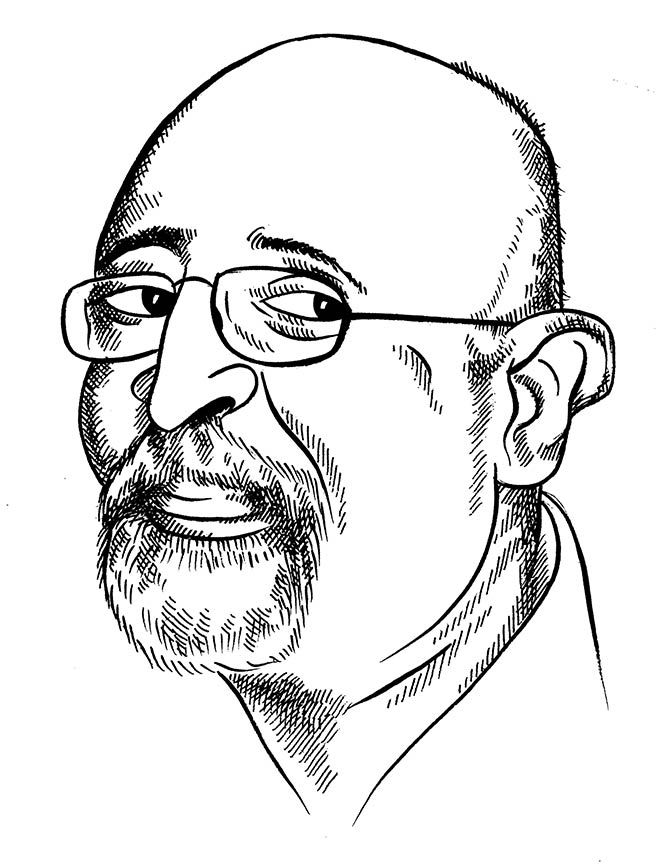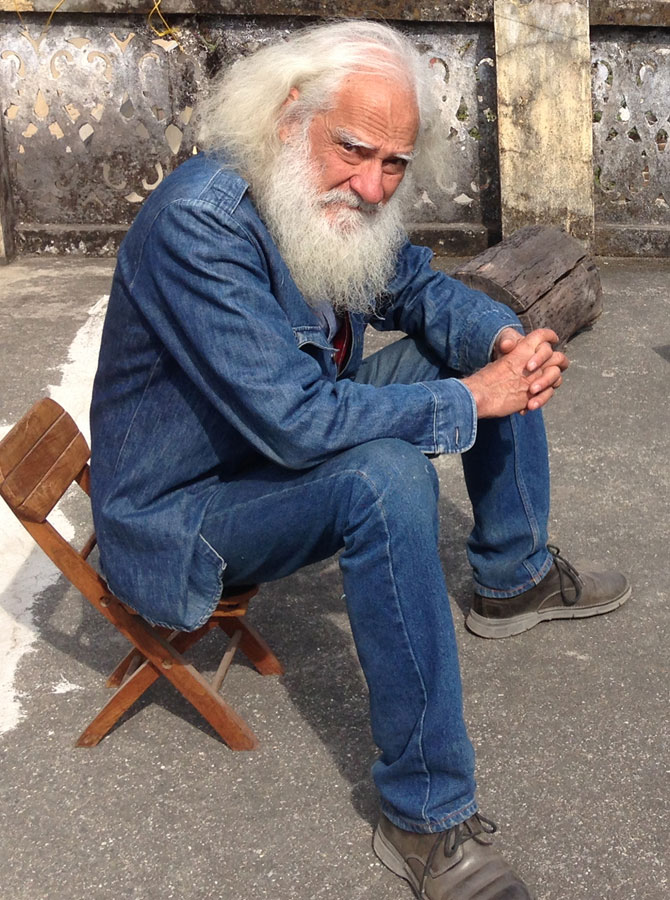Arundhuti Dasgupta Singhal meets the editor who transformed the venerable Economic & Political Weekly, who retires this week.
Illustration: Uttam Ghosh

"You must understand," Rammanohar Reddy says, his voice almost a whisper, "in many ways it was a dream job." Reddy, for the record, is one of the most soft-spoken men I know and I am worried, as I sit across the table straining my ears, whether the recorder will catch his words (it does, thankfully).
We are talking about 2004. The Economic & Political Weekly, famously described by historian Ramachandra Guha as a journal that commands an influence disproportionate to its circulation, had just lost legendary editor Krishna Raj, who had been editing the journal since 1969.
"He was suave, in a nice way, a gentle human being. He made you feel important." In many ways Reddy embodies quite a bit of the man he admires so much. He wears his erudition lightly and is embarrassed at any mention of the overwhelming support he has received from academia across the world after his resignation as editor of EPW.
Reddy was 20 when he first met Raj. Like all research students, Reddy wanted to be published in EPW. That didn't happen, but years later the two happened to meet.
Reddy was The Hindu's economics editor then, his career arc having moved through IIM (Kolkata), the Planning Commission and a doctorate from the Centre for Development Studies (Thiruvananthapuram). Raj hinted that EPW might look at a successor in him, but nothing came of that until a call from the board sometime after Raj died.
Ram recalls that it was not an easy decision to make. It would mean staying away from his family in Hyderabad for long stretches of time, but he discussed it with his wife and they decided that "it was an honour to be asked." There was no question of saying no.
Given that, the past few weeks must have been particularly trying. Media reports suggest there was a fallout between him and the Sameeksha Trust that manages the journal. The two disagreed on the journal's 50th anniversary celebrations and Reddy, who was set to retire in a few months, decided to call it a day before his time.
Before we meet, Reddy makes it clear he will not talk about the controversy. I ask him nontheless. He is too much of a gentleman to tick me off, so he replies with a smile and says that, having spent almost a decade with the journal, he is happy to have been here at all.
But the relationship with the board... has it been choppy or...?
He takes his time, but says nothing more than it has been good so far. It would take someone of a far more aggressive persuasion to get him to say anything at all, so I give up and move on to the menu, not wanting to jeopardise our lunch any further.
Our lunch has not begun on a promising note.
Nearly a week before we are to meet, a brief set of text messages over venue and time were exchanged and, in an almost serendipitous manner, we agreed to a 'fish' lunch.
We settled for Jai Hind Lunch Home, a typical no-frills Mumbai hole-in-the-wall eatery, whose reputation for meen gassi and pulimunchi is unmatched. But Jai Hind is not a place where one lingers over a meal and in that sense not the best choice for the conversation we want to have. But then, the glutton in me gets the better of my logical side.
On the appointed day, I arrive early to speak with the manager (plead, really) for a quiet corner where we would be allowed to overstay our welcome. I am greeted by half-down shutters and a large board saying, Jai Hind is temporarily shut. My lunch plans appear to lie in the dust.
A quick conference and we decide to troop across the road to Gajalee, which too had once been a small hole in a suburban wall, but has blossomed into a swankier avatar and sprouted many branches. It is now an unromantic version of its old self, but the food is still worth the trek.
The restaurant has barely opened and we find ourselves in a corner that overlooks the concrete facade of an anodyne steel-and-glass mall. Still, a patch of the sky manages to sneak its way into our view and makes up for the grimness of our surroundings.
After speedily ordering sol kadi, a tangy drink smushed out of kokum and coconut milk, I ask him how much of a challenge editing EPW was, where finances are always a worry and a hoary reputation an albatross round the neck.
Well, it was a big challenge, says Reddy. "I felt it needed fresh energy, it had become tired."
The magazine also needed to explore and exploit the Internet. "I set about trying to do many things."
Authors complained that they would not get acknowledgement for their articles, some felt only a 'certain' academic background made the cut and others that the magazine was stuck with one kind of a voice. Some of it, he felt, was not justified, especially about EPW being a closed club. But for the rest, he threw himself into the job.
The first thing was to set systems in place, ensure that "If it is a research paper, we will let you know within three to four months. If we publish it, it would be done within a year." Also, having come from a newspaper, Reddy went about making it more topical.
Finances were always fragile. "But once I showed my commitment, everyone pitched in."
The Tata trusts gave money and then the Nilekanis came in. Rohini Nilekani's contribution helped them locate to a bigger office while the Tata trusts helped with digitisation and computerisation.
The lunch has to be ordered. Reddy demurs; says, "I am not very adventurous, so we decide to go with the staples: Bombil fry (the fish Fried Bombay Duck) and Rawas curry, pomfret and neer dosas and bhakri.
It is actually quite remarkable that EPW has survived for so long. "I see it as a journal of dissent," says Reddy and is thankful to the EPW community for keeping it relevant. "It has grown because readers and writers from different backgrounds want to keep it going."
The journal is unique since its readers are also its writers; they keep a close watch. But they are supportive. "We pay a small honorarium, but many send it back saying that they just want to be a part of EPW."
Finances are still a problem, but going digital has helped where subscriptions are growing. When he joined, he was not sure whether there would be a print edition 10 years later, but it's still around.
Reddy has changed EPW. It has a more diverse set of voices and is immensely readable. "My greatest satisfaction was when we would discover some unknown author. The joy would be more when the author was from some small town or unknown university, and would send her article without any introduction."
He recalls: "In 2005 we received a long piece on water in Delhi and just sat on it, because we did not have time. Then Lakshmi Jain (the late Gandhian activist and Magsaysay Award winner) asked me to give it a second look... I did and we published it. The author was Arvind Kejriwal, then with an organisation called Parivartan (now defunct)."
"Then he became famous. I sent him an email congratulating him on the Magsaysay; he never acknowledged it." But Nobel Laureate (and EPW contributor) Angus Deaton did reply, with a personal letter. Deaton is among the 101 signatories to the letter to the board protesting Reddy's resignation.
Reddy has tried to give everyone, irrespective of their political beliefs, space as long as they make a sound analysis. EPW has even published Subramanian Swamy, Reddy says with some embarrassment.
It is time for dessert and the waiter brings in something that looks straight out of a MasterChef show on television. We refuse politely and ask for the tried and tested caramel custard, which does not disappoint with its usual gelatinous sweetness.
We are all creatures of habit, as is EPW for its tiny but powerful group of readers.











